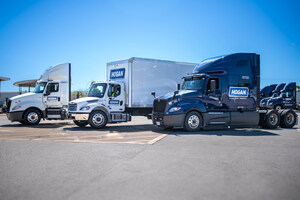
One in Three Americans are Driving Even More than Five Years Ago, Regardless of Remote Work and Sustainability Trends
ST. LOUIS, Aug. 27, 2024 /PRNewswire/ -- You've heard the stereotypes: Gen Z is delaying drivers licenses and using more public transit … and the car as we know it is dead. However, new data from global mobility leader Enterprise Mobility is shaking that belief, revealing that Gen Z and millennials are not only interested in driving, but they're actually driving more than any other generational age group.
Specifically, Enterprise Mobility's first "On the Move" mobility survey* found that Gen Z** (47%) and millennials (41%) estimate they are driving even more than five years ago, compared to Gen X (33%) and baby boomers (16%). And although the generations seem to not always agree, and transportation options are more plentiful than ever, a privately owned vehicle is generally prized for offering more "personal freedom" and "control" versus other forms of transportation.
In fact, an overwhelming majority of Americans surveyed (73%) expect privately owned vehicles to remain their top choice of transportation 10 years from now.
"As we look toward the future, it's important for us to stay informed about consumer perspectives on the current state of mobility," said Will Withington, Executive Vice President of Global Operations at Enterprise Mobility. "This survey represents a snapshot of how the public views a range of mobility trends, which helps us stay better informed as we work to develop and provide mobility solutions for our customers both today and in the future."
The buzz around autonomous vehicles (AVs) has been building for years, and 41% of Americans report excitement for the new technology, as it could have the potential to "make travel easier for people who can't or won't drive" (50% of those excited) and "gives people time to do other things in a car besides driving" (40% of those excited).
However, that excitement is tempered by a major hurdle today: Sense of control. Nearly three quarters of respondents (72%) prefer to be in control of the car they're driving (or riding in).
"Although there is some initial skepticism around AVs, we see that many consumers change their minds about the technology once they get a chance to experience it," said Withington. "As a global mobility leader, we are actively researching and testing new technologies, listening to preferences and concerns, and working to better understand how all of this might impact the future of mobility."
Electric vehicles (EVs) are becoming more mainstream, and 4 in 10 Americans would consider driving a fully electric vehicle in the future. The primary motivating factors for driving an EV are fuel cost savings (44%) and a positive environmental impact (34%). However, questions remain about the viability of EVs due to cost, inadequate charging infrastructure and environmental impacts. Enterprise Mobility's survey data shows that nearly 7 in 10 (68%) believe the U.S. does not currently have the proper infrastructure in place to support widespread EV adoption and the related range anxiety is the top deterrent from driving an EV.
"EV infrastructure looks vastly different across the U.S., and the reality is that current charging infrastructure in most regions does not meet the needs of drivers, with regard to availability, efficiency, reliability and convenience," said Withington. "We recognize the tremendous potential of EVs, and we're actively working with our teams and industry partners to put our customers at the center of everything we do. Our aim is to ensure our operations and the surrounding infrastructure can provide a positive experience and better support equitable access to the technology."
Many of those surveyed cite room for improvement on their daily commute as 45% of U.S. respondents agree their commute would improve if it cost less money and another 28% say it would improve if it caused less stress.
Interestingly, however, while a wide range of alternative transportation solutions exist to solve these commuting challenges—including car sharing and vanpooling— nearly a quarter of respondents (22%) say they have not heard of some or all of these services, which can be implemented by both businesses and consumers to help ease these pain points.
"Whether people prefer to 'share' a car for occasional trips to the office, or they want to maximize their travel time by vanpooling with coworkers, there are a wide range of mobility solutions available to get them where they need to go," said Withington.
Innovation and consumer expectations are transforming every aspect of the mobility industry. As the landscape continues to evolve, Enterprise Mobility is focused on investing in new technology and services to make the future of mobility easier, more convenient and more accessible.
For in-depth results of the Enterprise Mobility "On the Move" mobility survey, visit EnterpriseMobility.com/OnTheMove.
*The Mobility Survey was conducted online between January 22 – February 5, 2024, among a population of 3,000 total adults across the U.S. (n=1,500) and U.K. (n=1,500). Gen Z (15%), Millennial (28%), Gen X (25%), Baby Boomer (26%), Silent Generation (6%).
**This specific data point refers to a subset of Gen Z who were of driving age five years ago (aged 21 to 26 at the time of fielding). Elsewhere in the survey and press release, Gen Z refers to adult individuals aged 18 to 26.
TRUE Global Intelligence, the in-house research practice of FleishmanHillard, conducted the study with an opt-in-research panel. At the time of the survey, qualified participants were 18 years or older. The participants were analyzed by generational subgroups.
About Enterprise Mobility
Enterprise Mobility is a leading provider of mobility solutions including car rental, fleet management, flexible vehicle hire, carsharing, vanpooling, truck rental, luxury rental, retail car sales and vehicle subscription, as well as other transportation technology services and solutions, to make travel easier and more convenient for customers. Enterprise Mobility, inclusive of its subsidiaries and franchisees, and affiliate, Enterprise Fleet Management, manage a diverse fleet of 2.3 million vehicles through an integrated network of nearly 9,500 fully staffed neighborhood and airport rental locations in more than 90 countries and territories. Privately held by the Taylor family of St. Louis, Enterprise Mobility manages the Enterprise Rent-A-Car, National Car Rental and Alamo brands.
SOURCE Enterprise Mobility







Share this article